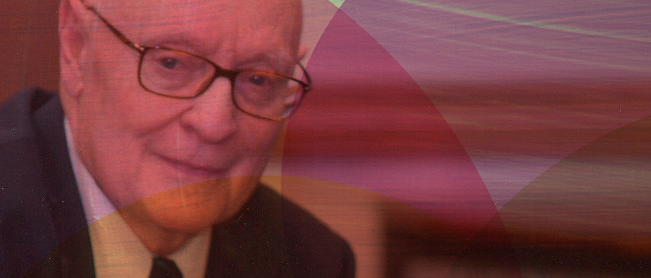Q & A with prolific philosopher Nicholas Rescher
Q & A with prolific philosopher Nicholas Rescher
Acclaimed, prolific philosopher Nicholas Rescher is featured in our newest Q&A. His latest book is A Journey through Philosophy in 101 Anecdotes.
UPP: You earned your doctorate at Princeton in 1951 at the age of 22, a record for that university’s philosophy department, and have been hard at work in the field ever since. So, why philosophy as a career?
NR: At the outset my career choice ran neck and neck between philosophy and mathematics. But I found that I had to work at mathematics while philosophy seemed to come naturally.
UPP: In the Introduction to your new book, A Journey through Philosophy in 101 Anecdotes, you say that philosophers have always employed “little stories that help to make big points.” One of the shortest anecdotes in the book, at about 225 words, is “Russell’s Chicken.” Can you describe the big point in this tiny story?
NR: Russell’s chicken labored under the mis-impression that things will keep going along as they have been. Most of us do the same, whether we be stock market investors or farmers. But fashions, circumstances, and even climates change. It is good to be reminded of this from time to time.
UPP: The anecdotes are presented in a chronological manner, but you also include a list of “Thematic Clusters” as an alternative way to approach the book. In the cluster titled “Society and Politics,” the area of Political and Public Affairs has more anecdotes than any other subject. Why do you think politics and public affairs are tied to so many philosophical issues?
NR: We have to live an organized society that is mostly not of our making. Its economic, social, cultural, and political affairs are obviously important to us because they set the stage for our lives. Philosophers cannot avoid these issues.
UPP: The last anecdote concerns the French philosopher Jacques Derrida, who died in 2004, and was famous for the contrived obscurity of his writing. Why would a philosopher deliberately make it difficult to share his ideas?
NR: Philosophy is also taught in France’s secondary schools. There, the teachers focus on the great classics of the 17th and 18th century–Descartes, Montesquieu, Rousseau–thinkers for whom classical clarity was important. By contrast, university teachers fall under the influence of Kant and Hegel. Coming to terms with these difficult writers seems to have convinced them that obscurity is indispensable for philosophical profundity and that of it can be said clearly and understood readily, it cannot be of much significance.
UPP: You’ve written over 100 philosophy books, but what hobbies and pastimes do you enjoy to take a break from the field?
NR: By ways of diversion, I read (mainly history and biography). I watch Netflix, mainly documentaries and English costume dramas. Also, I play contract bridge in local competitions. In the bridge competitions, I and my partner (a retired engineer) turn in yo-yo-like performances, sometimes quite high, sometimes quite low!


COMMENTS